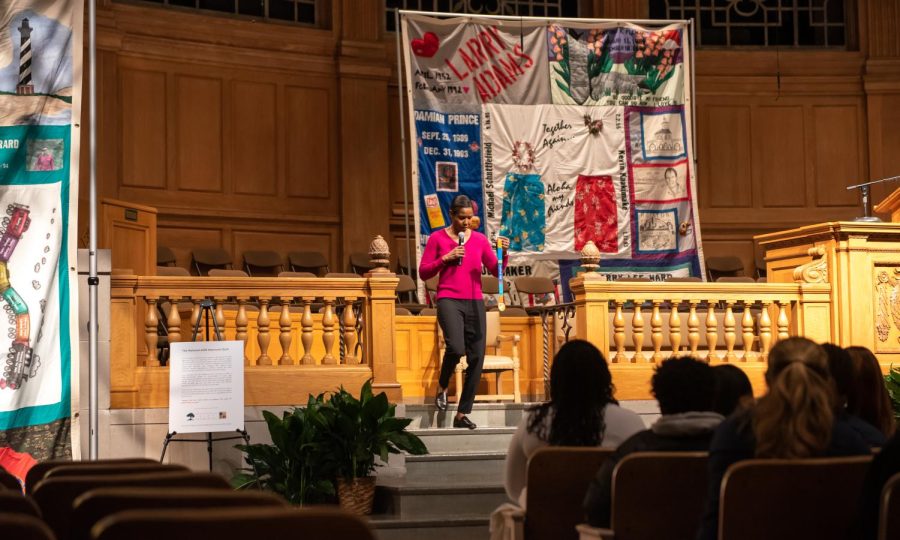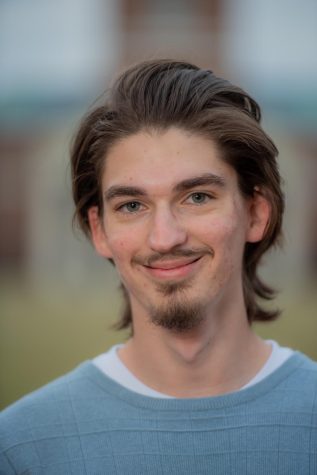Briana Scurry delivers keynote address at MLK Day celebration
The olympian and World Cup champion was the first LGBTQ+identified MLK Day keynote speaker
Some sections of the quilt serve as the background to Briana Scurry’s MLK Day keynote.
January 18, 2023
Sixty years after the Rev. Dr. Martin Luther King Jr. was the first Black man invited to speak in Wait Chapel, legendary goalkeeper Briana Scurry was the first LGBTQ+ identified MLK Day keynote speaker invited to Wake Forest. And like King, she too spoke about dreams.
“Dreams are in your heart for a reason,” Scurry, two-time Olympic gold medalist and World Cup champion said. “They are things you are supposed to do… and they will speak to you through your heart.”
When she was 12 years old, Scurry joined her school’s soccer team. A few years later, she wrote her dream on a piece of printer paper that she posted on the wall next to her bed. In her keynote address, she described how every morning and every night, she would look at the paper and let her dream inspire her: “Olympics 1996 – I have a dream.”
Scurry was the first Black and openly gay starting goalkeeper on the U.S. Women’s National Team and is now an author and mental health advocate. She was welcomed and introduced by President Susan Wente and Winston-Salem State University Chancellor Elwood Robinson as this year’s “Building the Dream” keynote speaker, part of a 22-year-old collaboration between Wake Forest and Winston-Salem State University.
Throughout her address, Scurry encouraged students to have faith in themselves, using her story as an example of the power of self-efficacy and external support.
“Because all it takes for you to reach the heights of giants, the heights of people who have changed the world,” Scurry said, “is faith — someone having faith in you, and you having faith in yourself.”
She continued: “I was a little, skinny girl in a predominantly white neighborhood, [one of] the only African American families in that town. No one looked like me. But I had things that I was going to do… and no one was going to stop me from doing them.”
In retelling her journey, Scurry described many obstacles she faced during her career, from playing the seven-year defending soccer champion, University of North Carolina at Chapel Hill, during her senior year at University of Massachusetts to the passing of her father two months before playing in the 2004 Summer Olympics in Athens.
Despite these challenges, Scurry explains how the support of her coaches, teammates and parents helped her view each hardship as an opportunity. The resilience she exhibited while playing against UNC led to her recruitment for the U.S. Women’s National Team, and the spirit of her father helped her play “out of [her] mind” in an Olympic game in which she was “torn to pieces.”
After years of fighting for equity in women’s sports and maintaining a career worthy of the National Hall of Fame, Scurry faced a more personal conflict after receiving a career-ending head injury.
Having launched into a downward spiral of depression and anxiety, Scurry described her experience battling doctors and insurance companies for the care she wasn’t getting but knew she needed. The title of her new book, “My Greatest Save,” describes in detail her experience with the mental health crisis that brought her close to suicide in 2013.
“Part of what I like to do is be very honest, very authentic and very real about the things that I had to go through in order to get to where I am,” Scurry said.
She continued: “I went from that ledge to having a life 10 years later that I never could have imagined having. Even before my injury, even when I was playing, I never thought I could have a life as amazing as I have. I say that to say this — you never know what’s working for your good. You have to keep faith, fire and keep your eyes on the prize.”
Before delivering her keynote address, Scurry sat down to have lunch with female student athletes and coaches where she answered questions about filling the void after soccer and becoming a better teammate and a more understanding leader. Organized by the Intercultural Center, the luncheon gave students the opportunity to meet a hero.
“I think it’s really nice having a figure that represents a part of your identity that you don’t really see every day,” Kaitlyn Parks, a senior on the women’s soccer team and one of the event’s introductory speakers, said. “I’m also a woman of color that is part of the LGBTQ community, and that’s not an intersection that you see very often. So having someone that’s so successful in their career have that platform to share their story I think is very inspiring.”
At the luncheon and in her address, Scurry acknowledged the hard work that it takes for students and student athletes to succeed academically and athletically.
“Know that all the rigors and expectations you have now are preparing you to go chase your dream,” Scurry said. “It’s better to be prepared on a razor’s edge than not to be prepared at all. You want to have a challenge. Embrace that. Seek that out.”























